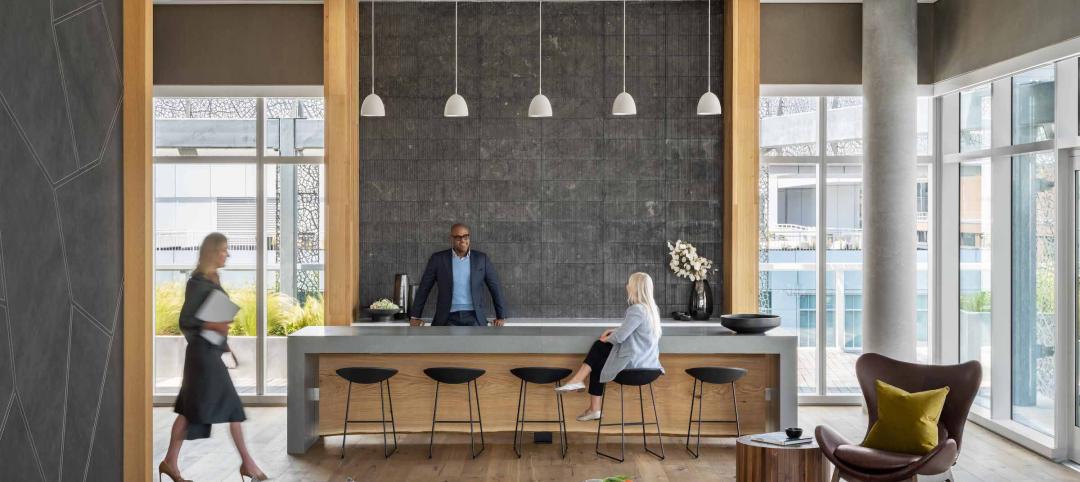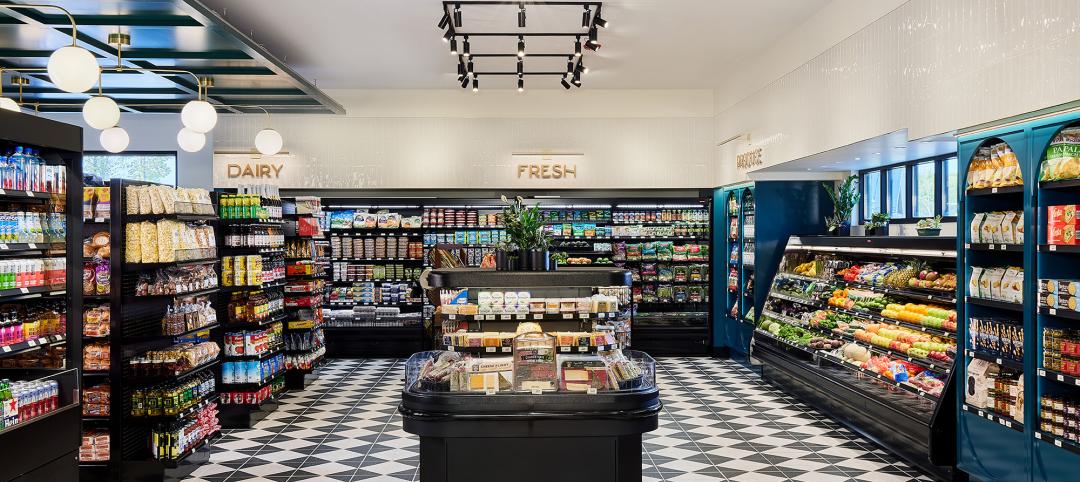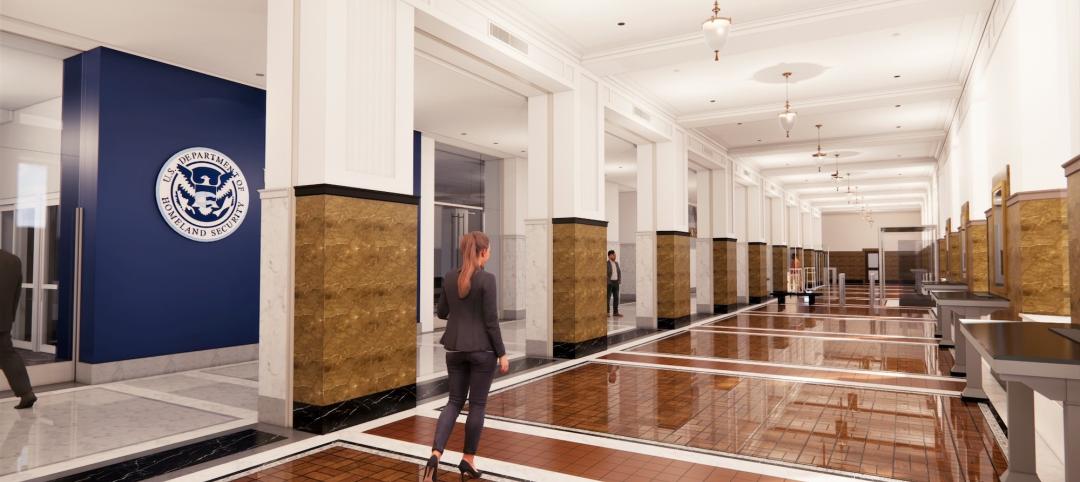Completed in 1932, the Potter County Courthouse is recognized as one of the most significant high-rise Art Deco courthouses in Texas, and among the most prominent in the country. Local architect W.C. Townes, of Townes, Lightfoot and Funk, designed the eight-story structure with a terra cotta fac?ade adorned in decorative figural and botanical bas-relief depicting the region’s cultural and natural history.
After more than 80 years of use, the courthouse was long overdue for an interior modernization and exterior restoration. The $15.5 million effort was undertaken as part of the Texas Historic Courthouse Preservation Program, a state-funded program that covered about one-third of the project’s cost. It included a complete fac?ade restoration—including repairing and re-anchoring damaged units and replacing mortar joints—and an overhaul of the interior spaces to meet current building and accessibility codes and the operational and functional needs of the county’s administrative offices and courts.
The original mechanical systems were replaced with a four-pipe scheme utilizing a 200-ton chiller and 250-ton cooling tower. An additional 60-ton, air-cooled chiller was placed on the roof, and 12 air-handling units were located on the various roofs at the fifth, sixth, and eighth floors. The new system, combined with automatic controls and enhanced thermal roof insulation, is expected to reduce energy costs by 20% annually.
POTTER COUNTY COURTHOUSE
Amarillo, TexasBuilding TeamSubmitting firm: JQ (structural engineer)Owner: Potter CountyArchitect: ArchiTexasMEP engineer: Johnson Consulting EngineersConstruction manager: Southwest General ContractorsGeneral contractor: Journeyman ConstructionGeneral InformationSize: 62,390 sfConstruction cost: $15.5 millionConstruction time: November 2009 to August 2012Delivery method: Design-bid-build
The Reconstruction Awards judges hailed the Building Team for its painstaking efforts in preserving the historical elements of the building while modernizing the structure. To accommodate the new mechanical systems and other modern amenities, such as fire/life safety systems, information technology infrastructure, and high-density shelving units, the team devised several creative structural solutions:
• Tunnel expansion. To preserve the courthouse’s original, first-floor terrazzo floors, the team utilized the facility’s underfloor utility tunnels to run new insulated piping. Deemed inadequate to handle the new systems, the existing tunnels had to be carefully reinforced and expanded. In total, more than 200 feet of concrete- and masonry-lined tunnel was added on to the existing layout, allowing for the terrazzo flooring to remain intact.
• Clay tile floor removal. The added weight of the rooftop mechanical units and high-density shelving meant that certain areas of the existing structure on floors two through six would need to be reinforced. However, because the plaster ceiling finish was applied directly to the original clay tile and reinforced concrete joist floor system, structural members could not be inserted below the original ceiling level.
The solution involved removing portions of the original clay tile forms to allow the installation of new steel beams constructed from steel T-sections between the existing concrete joists, thereby increasing the floor load capacity. The use of T-sections in lieu of standard wide-flange sections facilitated access for completion of field connections to the existing structure and the placement of non-shrink grout between the top of the steel members and the underside of the original floor slab to provide full load transfer.
• Use of CFRP strips. In order to accommodate new stairs, vertical chases, and mechanical infrastructure, numerous openings of various sizes had to be cut into the slab on floors seven and eight. The original floor structure on these levels is eight-inch reinforced concrete slabs spanning the concrete beams.
To maintain the structural integrity and continuity of the floor slabs, strips of laminated, 1?4-inch-thick carbon fiber reinforcement polymer (CFRP) were used to redistribute the loads adjacent to and around the openings. Larger openings for the stairs and chases called for additional reinforcement, and CFRP strips were placed on top or below the slab, corresponding to the tension zone of the slab system.
In several locations, strips were placed in both directions around the openings to properly distribute the load.
“We liked how the team carefully pre- served the clay-tile floor and the reinforced concrete slab with the strengthening schemes hidden out of sight,” said judge K. Nam Shiu, Senior VP, Director of Restoration Services, Walker Restoration Consultants (www.walkerrestoration.com). “They successfully provided up-to-date floor functionality while keeping the layout and look of the original building.”
The Building Team took careful measures to avoid disturbing the historical elements in the building. This included expanding an existing utility tunnel (above) and applying special structural reinforcement polymer to select concrete frame members (top). Photo: Brenda Bagot
Related Stories
Resiliency | Sep 25, 2023
National Institute of Building Sciences, Fannie Mae release roadmap for resilience
The National Institute of Building Sciences and Fannie Mae have released the Resilience Incentivization Roadmap 2.0. The document is intended to guide mitigation investment to prepare for and respond to natural disasters.
Data Centers | Sep 21, 2023
North American data center construction rises 25% to record high in first half of 2023, driven by growth of artificial intelligence
CBRE’s latest North American Data Center Trends Report found there is 2,287.6 megawatts (MW) of data center supply currently under construction in primary markets, reaching a new all-time high with more than 70% already preleased.
Giants 400 | Sep 20, 2023
Top 130 Hospitality Facility Architecture Firms for 2023
Gensler, WATG, HKS, and JCJ Architecture top BD+C's ranking of the nation's largest hospitality facilities sector architecture and architecture/engineering (AE) firms for 2023, as reported in Building Design+Construction's 2023 Giants 400 Report. Note: This ranking includes revenue for all hospitality facilities work, including casinos, hotels, and resorts.
Adaptive Reuse | Sep 19, 2023
Transforming shopping malls into 21st century neighborhoods
As we reimagine the antiquated shopping mall, Marc Asnis, AICP, Associate, Perkins&Will, details four first steps to consider.
Giants 400 | Sep 18, 2023
Top 200 Office Building Architecture Firms for 2023
Gensler, Stantec, HOK, and Interior Architects top BD+C's ranking of the nation's largest office building sector architecture and architecture/engineering (AE) firms for 2023, as reported in Building Design+Construction's 2023 Giants 400 Report. Note: This ranking includes revenue for all office building work, including core and shell projects and workplace/interior fitouts.
Resort Design | Sep 18, 2023
Luxury resort provides new housing community for its employees
The Wisteria community will feature a slew of exclusive amenities, including a market, pub, and fitness center, in addition to 33 new patio homes.
Life of an Architect Podcast | Sep 18, 2023
Life of an Architect Podcast Ep. 134: Management 101
It happens to most people eventually. Some get there quickly, while others take a bit longer. Transitioning into a management role is a natural evolution of skill development, but that doesn’t necessarily make it any easier. Chances are you’re ready for management, but in case you’ve questions, we think we have answers.
Hotel Facilities | Sep 15, 2023
The next phase of sustainability in luxury hotels
The luxury hotel market has seen an increase in green-minded guests looking for opportunities to support businesses that are conscientious of the environment.
Adaptive Reuse | Sep 15, 2023
Salt Lake City’s Frank E. Moss U.S. Courthouse will transform into a modern workplace for federal agencies
In downtown Salt Lake City, the Frank E. Moss U.S. Courthouse is being transformed into a modern workplace for about a dozen federal agencies. By providing offices for agencies previously housed elsewhere, the adaptive reuse project is expected to realize an annual savings for the federal government of up to $6 million in lease costs.
Data Centers | Sep 15, 2023
Power constraints are restricting data center market growth
There is record global demand for new data centers, but availability of power is hampering market growth. That’s one of the key findings from a new CBRE report: Global Data Center Trends 2023.




















